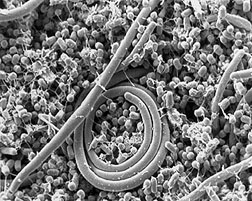|

Salmonella
enteritidis. Click the image for more information about
it.
|
Rapid Salmonella Test May Reduce Meat and Produce
Recalls
By Sharon Durham March 17, 2006
An innovative test to detect Salmonella in ready-to-eat meats
has been developed by Agricultural Research Service (ARS) scientists. The preliminary
test--still being evaluated by agency researchers--relies on PCR (polymerase
chain reaction) technology to detect food-contaminating microbes on a molecular
level.
Food technologist
Jitu
Patel with the ARS
Food
Technology and Safety Laboratory, and microbiologist
Arvind
Bhagwat with the ARS
Produce
Quality and Safety Laboratory, in Beltsville, Md., compared their
laboratory-developed “molecular beacon” test to a commercial
rapid-detection test currently in use. While both tests can detect
Salmonella in eight hours, the laboratory test is less expensive than
commercial kits.
To evaluate the new test's efficacy, the scientists artificially
contaminated various meats (turkey, bologna and ham slices) and produce (mixed
salad, sprouts) with S. enterica serovar Typhimurium and allowed it to incubate
for 20 hours. Both tests were sensitive enough to detect contamination in the
meat products at an estimated level of two to four cells per 25 grams. In
comparing the tests after a relatively brief incubation period of eight hours,
two to four cells of Salmonella were detected in the 25-gram samples of meat as
well as produce.
The ability of the molecular beacon test to detect very low levels of
Salmonella contamination in eight hours will aid the food industry in quality
assurance, helping prevent recalls of contaminated meats and produce by
stopping the products from being introduced in the marketplace. Detection of
contaminated foods could be achieved within a work shift--before shipment takes
place.
ARS is the U.S. Department of
Agriculture’s chief scientific research agency.